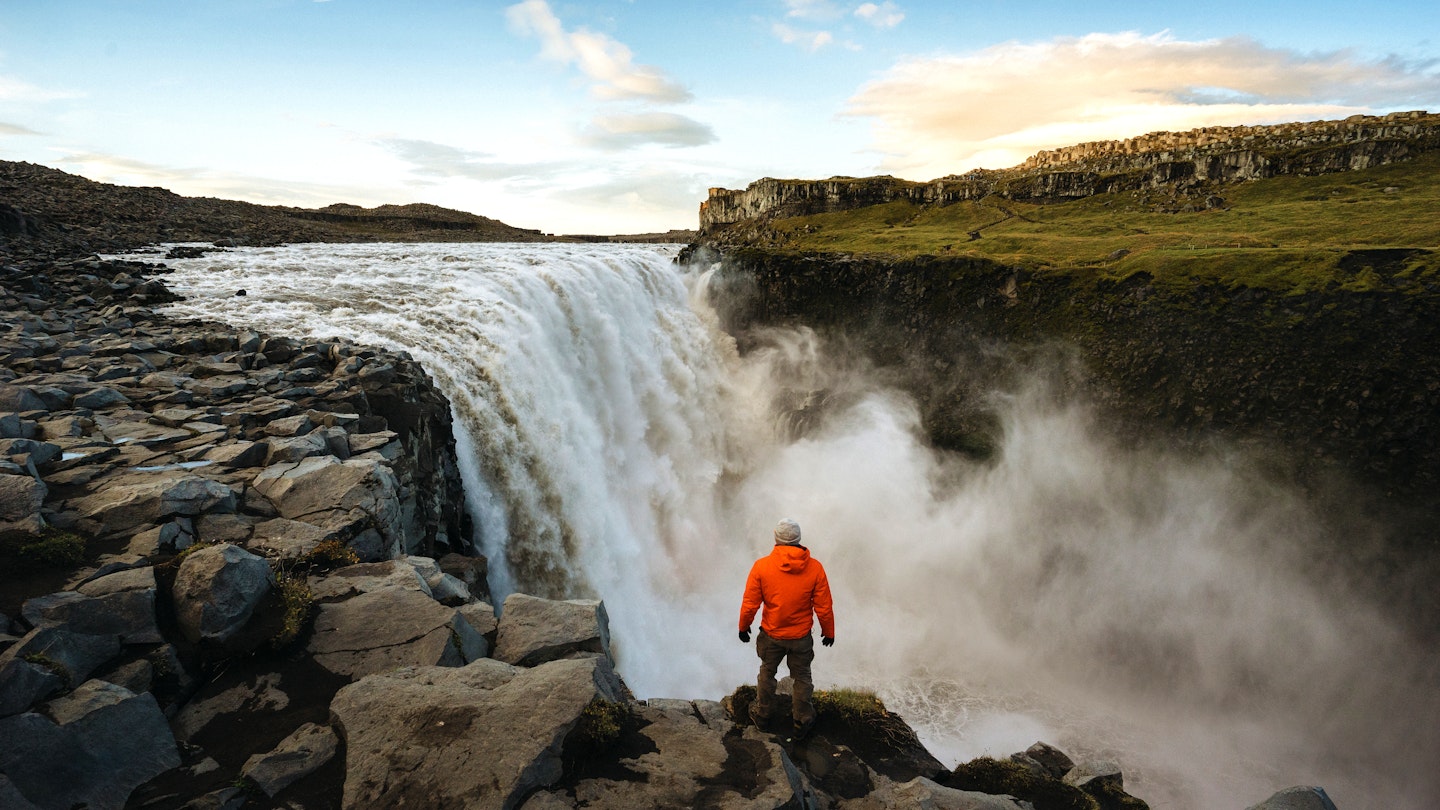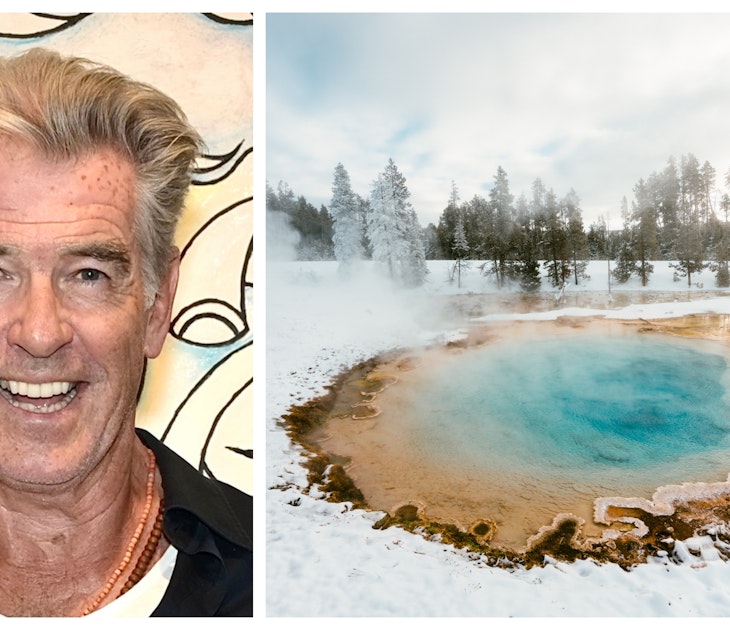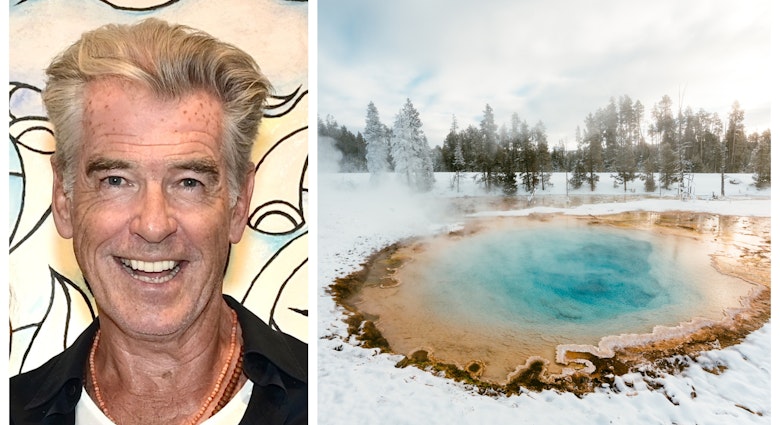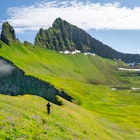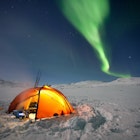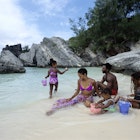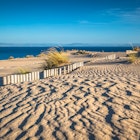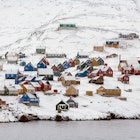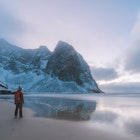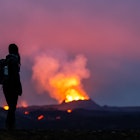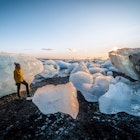Based on its name alone, you might picture a vast frozen wilderness, but actually only 11% of Iceland is covered with ice.
Beyond that, there are many varied and gorgeous landscapes for you to explore on an amazing hike. This guide to the best trekking routes in Iceland covers different regions of the country, so be ready to strap on your boots and set off on the adventure of a lifetime.
1. Dettifoss Waterfall, North Iceland
Best waterfall hike
3.5km (2.2 miles) round-trip; 1–2 hours; 95m (312ft) elevation; easy
Stand in the presence of an incredible natural force when you visit Dettifoss, the second most powerful waterfall in Europe. This “must-do” stop along the famous Diamond Circle route in North Iceland, is a testament to why sometimes it’s true that bigger is better.
Arriving at the viewpoint is likely to send butterflies straight to your stomach. You might even catch a rainbow or two as the mist from the mighty waterfall hangs in the air. Whether you're hiking in winter or summer, the views of the waterfall are incredible.
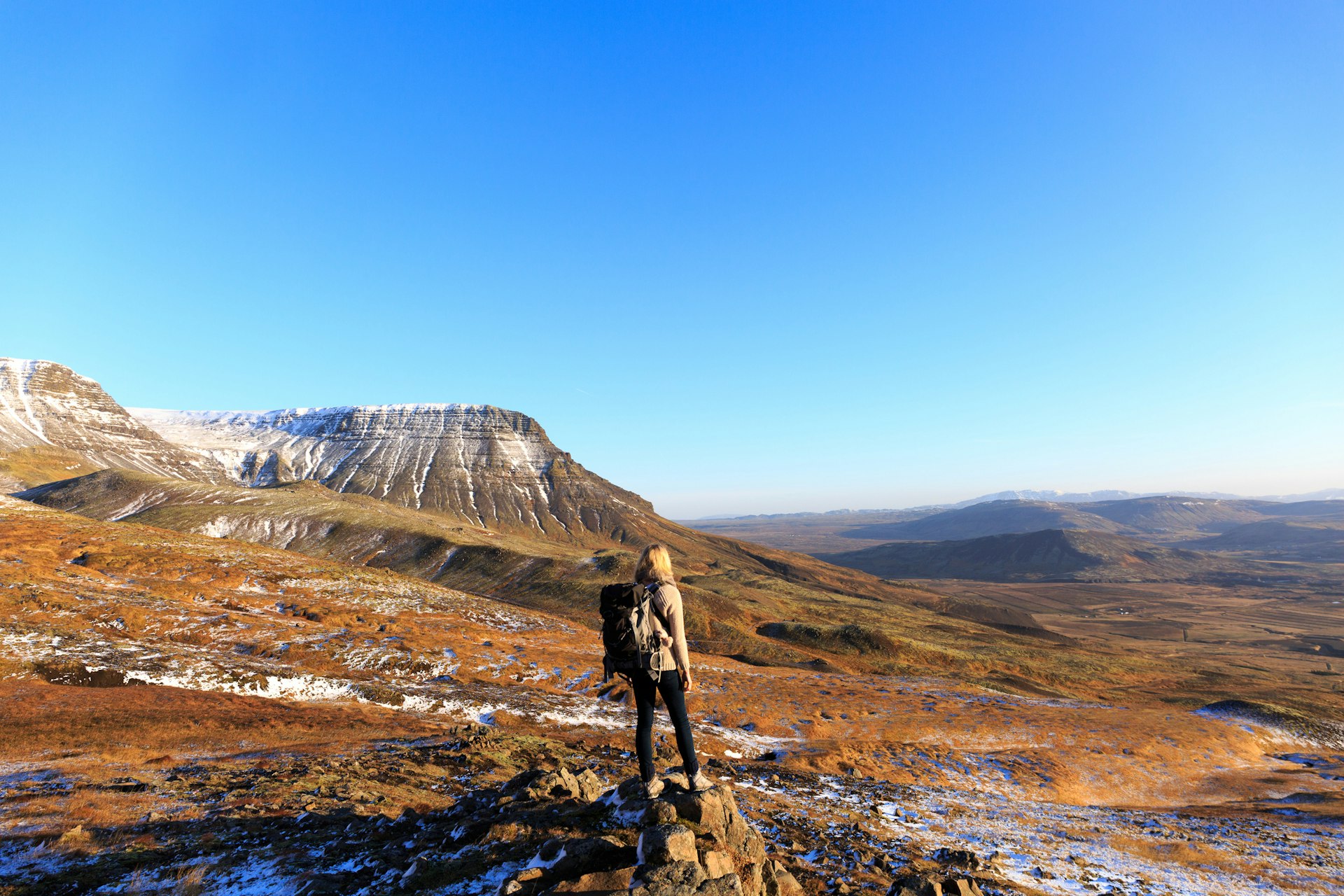
2. Mount Esja, just outside Reykjavík
Best hiking route near the capital city
7.7km (4.8 miles) round-trip; 3 hours; 723m (2372ft) elevation; challenging
Reykjavík’s skyline would not be complete without the impressive Mount Esja as a gorgeous backdrop, and the mountain’s dominating presence reminds city dwellers that nature is just a stone’s throw away.
This volcanic mountain range is home to several well-worn hiking trails, most of which end at Steinn (the rock), aptly named after the giant rock on the mountain. The gorgeous views of the metro Reykjavík area, the sea and nature along the trail make this short drive from downtown a no-brainer for hikers looking for a walking route near the city.
For an extra challenge and even more spectacular views, keep hiking up the steep path to the top of the mountain range. The few that make it this far can memorialize their visit by signing their name in a visitor book and enjoy the top of the mountain range practically to themselves.
3. Reykjadalur Hot Spring, near Reykjavík
One of Iceland's most popular hikes
8km (4.9 miles) round-trip; 2 hours; 347m (1138ft) elevation; moderate
As one of the most popular hikes in Iceland, thanks to its proximity to Reykjavík and a relaxing hot spring river hikers can soak in, this 8km-long (4.9-mile) trek to the Reykjadalur Hot Spring Thermal River is full of enchantment. It takes one hour to arrive at the geothermal river, but steam can be seen rising from the various hot springs dotted along the path.
In summer, visitors can enjoy the vibrant and dewy green grass covering the mountains, but as winter sets in, this area transforms into a wonderland of snow. Regardless of the season, a warm soak in the calm and soothing hot spring river is a must. Bring a pair of water shoes to avoid slipping on rocks in the water.
4. Geldingadalir/Fagradallsfjall Volcano Hike, Reykjanes Peninsula
Iceland's best volcano hike
4.2km (2.6 miles) point to point; 1–2 hours; 284m (932ft) elevation; moderate to challenging
Volcanic eruptions in Geldingadalir Valley started in March 2021, rebooted in August 2022, and once again kicked off in July 2023, catching the attention of media outlets around the world. This amazing spectacle of new earth being born attracts photographers, hikers and adventure-seekers to this secluded area to witness this natural phenomenon.
But it's not guaranteed, and it's not always safe to visit. Check online with Safetravel for updates, closures and maps of the hazard zone; remember that the landscapes are constantly changing due to the steady flow of lava into the valley, and new erupting fissures can open up anywhere without notice. You can also set up safety alerts from Safetravel to keep you updated on the situation.
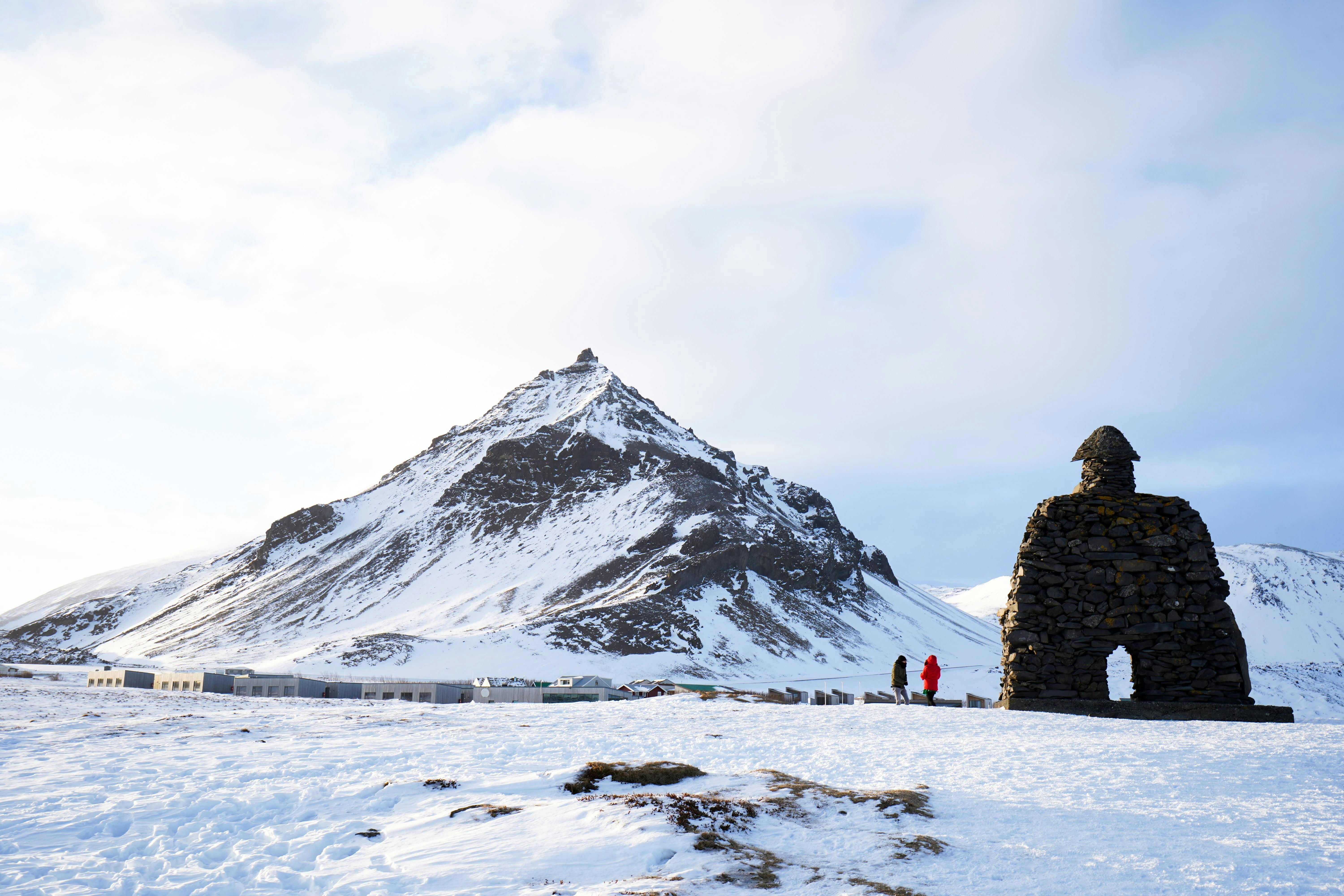
5. Snæfellsjökull Glacier, West Iceland
One of Iceland's best glacier hikes
9.5km (5.9 miles) round-trip; 7–10 hours; 841m (2759ft) elevation; challenging
In one of Iceland's three national parks, Snæfellsjökull glacier was the location of the subterranean entrance in the novel Journey to the Centre of the Earth. It's also said to have a mysterious energy that can be felt by some of the locals.
The journey from Icelandic summer temperatures at the base of the glacier to what appears to be a winter wonderland at the top is taxing on the body but enriches the mind and soul. Experienced hikers who take on the challenge of summiting this glacier are handsomely rewarded with incredible views of the stunning Snæfellsnes Peninsula.
6. Glymur Waterfall, West Iceland
Iceland's best short hike
6.9km (4.3 miles) loop; 3–4 hours; 397m (1302ft) elevation; moderate
In just an hour from Reykjavík, you cross mystical streams and a river as you hike your way up to Glymur, Iceland's second-highest waterfall, cascading down at 198m (650ft). This West Iceland jewel is found on a moderate 6.9km (4.3-mile) loop that boasts impressive steep cliffs, rivers, caves and birds gliding effortlessly around the waterfall. It's easily one of Iceland's best short hikes.
7. Stuðlagil Canyon Hike, East Iceland
Best easy hike for great photographs
9.2km (5.7 miles) round-trip; 2–3 hours; 171m (561ft) elevation; easy
A hike full of character and wondrous natural formations, Stuðlagil is like something out of a fairy tale. Featuring a stately basalt column canyon and a captivating blue glacier river, this gem of East Iceland wins best spot for epic Instagram photos.
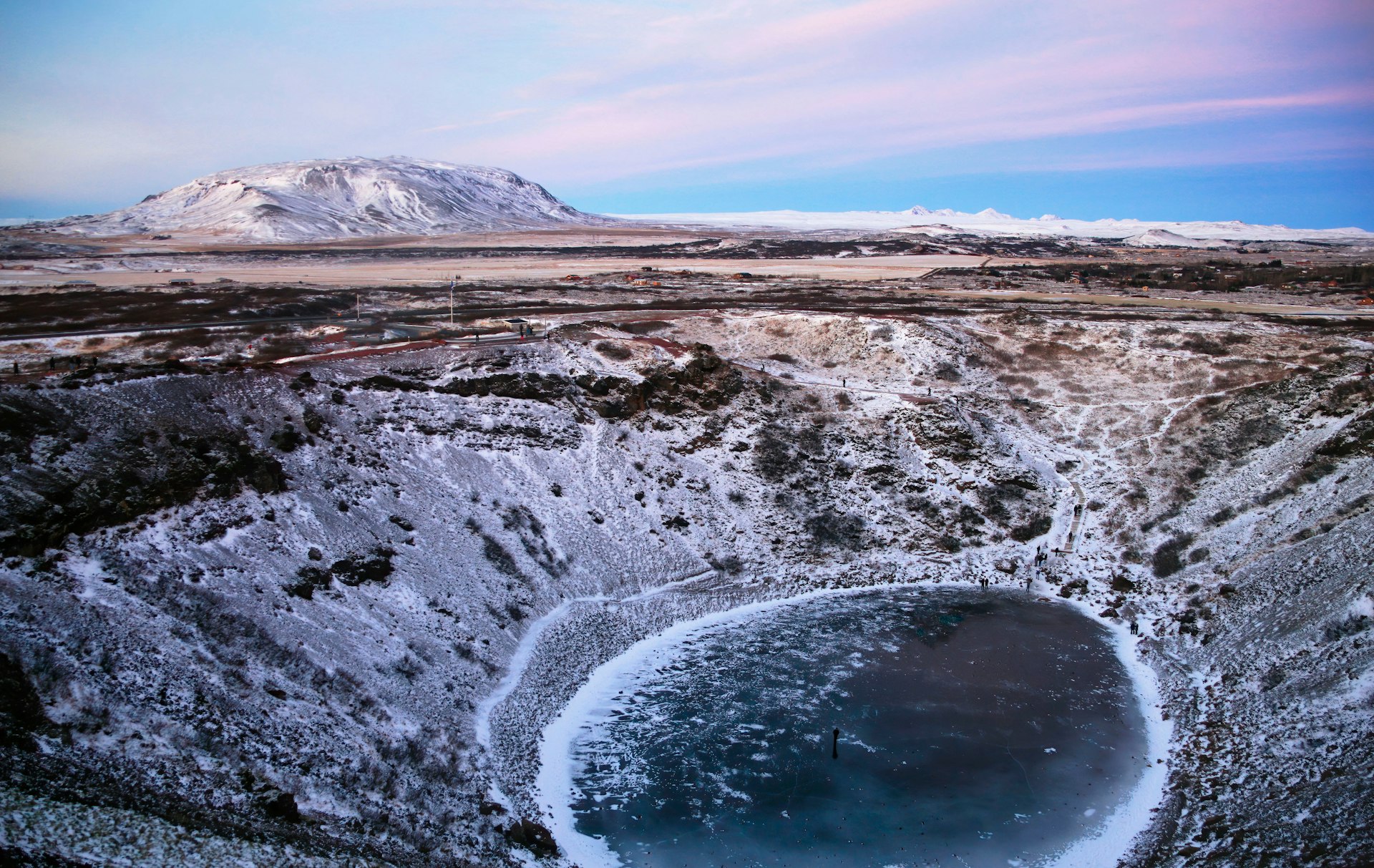
8. Kerið Crater Lake, South Iceland
Best accessible hike
1.4km (0.8 miles) round-trip; 1 hour; 35m (115ft) elevation; easy
If you’re looking for a stunning short and easy hike in a landscape that is bursting with color and character, look no further than Kerið Crater in South Iceland. The combination of bright-red lava rock, neon-green moss and a blue-green lake is a visual delight.
This picturesque area has a well-laid path overlooking the crater and lake, making it one of the best hikes in Iceland for wheelchair accessibility. Though keep in mind that if you want to go down into the crater for a closer view of the water, there are quite a few stairs. However, the viewpoints of the crater are more than sufficient.
9. Sólheimajökull, South Iceland
One of the best places for a glacier hike
2.4km (1.5 miles) round-trip; 1 hour; 114m (374ft); moderate
Located between Katla and Eyjafjallajökull in South Iceland, two of Iceland’s infamous volcanoes, Sólheimajökull is one of the country’s most popular spots for a glacier hike. It embodies much of Iceland into one: impressive scenery, towering volcanoes and a mysterious icy landscape that gives off the feeling of a faraway alien planet.
Depending on your schedule and physical fitness, you can opt for a fun and easy glacier hike, or you can kick it up a notch with a longer hike that includes ice climbing. But be aware: proper equipment and an expert guide are a must when exploring a glacier. The ever-changing icy terrain poses a danger to inexperienced hikers who are not aware of the hidden crevasses, ice caves and slippery surfaces typically found on a glacier.
10. Lake Mývatn Loop, North Iceland
Best scenic hike
36.4km (22.6 miles) loop; 8 hours; 739m (2425ft) elevation; moderate
A highlight of the Diamond Circle, Lake Mývatn is rich with local flora and fauna. The loop around the shallow volcanic lake begins and ends in the quaint village of Reykjahlíð, but you walk for as little or long as your heart desires. The area is dotted with tiny green islands, volcanic craters, and gorgeous views of the surrounding mountains. The cherry on top is that not many people know about this path, so you might have this scenic loop all to yourself.
11. The famous Laugavegur Trail, Highlands
Iceland's best multiday hike
52.1km (33 miles) point-to-point; 4 days; 1772m (5814ft) elevation; moderate
Witness the majestic landscapes of the Icelandic highlands as you start from the rhyolite-colored mountains in Landmannalaugar’s geothermal area and end in Þórsmörk nature reserve, a lush, forested valley named after the Norse god Þór (Thor).
On the trek from one hut or campsite to the next, you’ll get a taste of just how varied the Icelandic highlands can be. Over the four incredible days, you’ll cross wildflower fields and black desert sand, hike between vivid mountainsides and black obsidian lava, as well as wade through flowing glacial rivers. It’s the perfect hike for those that want to unplug from the digital world and reconnect with nature.
12. Látrabjarg Cliff, Westfjords
Best hiking route for spotting seabirds
5.3km (3.3 miles) round-trip; 2–3 hours; 521m (1709ft) elevation; easy
There is nothing quite like seeing puffins nesting peacefully by the ocean on the tranquil hike alongside Látrabjarg Cliff. This magnificent cliff is on the westernmost tip of Iceland, but the drive and vast ocean makes it feels like the edge of the world. Seabirds of all kinds can be spotted here, but puffins only nest in Iceland from late April to August, so don’t miss the window to observe these fascinating and docile birds from a safe distance.
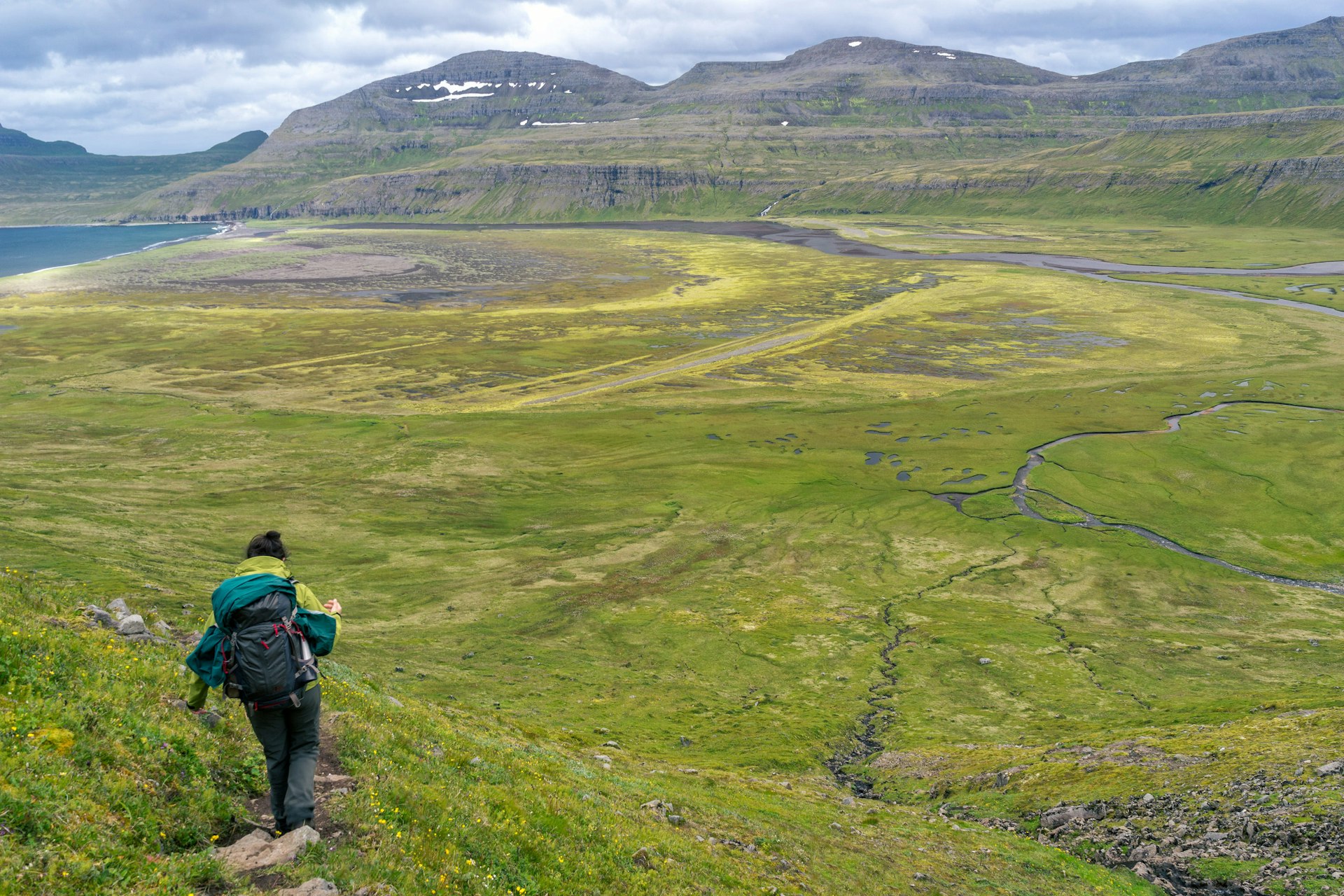
13. Hornstrandir, Westfjords
Best hike in the summer months
80.6km (50.1 miles) point-to-point; 6 days on average; 3562m (11,686ft) elevation; hard
Experience pure Icelandic wilderness on a multiday hike in the secluded Hornstrandir Nature Reserve. For starters, you can only access this stunning part of the Westfjords by boat. This off-the-grid oasis is the only place in Iceland where the arctic fox is completely protected from being hunted. To the delight of visitors, spotting these adorable inhabitants is a common occurrence – have your cameras ready!
Due to its far north location, Hornstrandir can have a mix of snow and bright green cliff sides in the summer months, which is the only time you can visit. While one day hiking excursions are possible, it’s highly recommended to set aside a few nights to bask in the remote and rugged solitude of Icelandic nature.
Top tips for hiking in Iceland
- The weather in Iceland can change drastically at a moment’s notice. Always check the weather before heading out and do not go hiking in an area with a storm warning.
- Use Safetravel, the official source for safe travel in Iceland, to check for alerts and to submit a travel plan.
- Packing and wearing appropriate layers of clothing in Iceland, especially rain resistant gear, will keep you dry and warm on your adventure.
- Pack microspikes if you plan to do winter hiking. Trails can be very slippery if ice forms.
- There can be midges or even biting flies during the summer, so it is always good to have a flynet in your hiking backpack.
